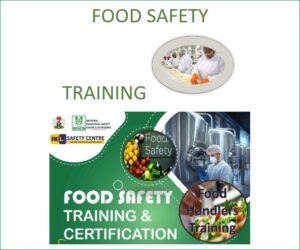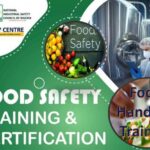Our food hygiene and safety training from partner at foodsafety.org.ng reduces the chances of food contamination or food poisoning, protecting both the public and companies’ reputation. It also covers Food safety-policies, guidelines and national laws of the occupational safety and health dept.
Our Courses are designed for low to high-risk food handlers, supervisory or management position who do come into contact with food, or those with responsibility for a critical control point – as highlighted within Hazard Analysis Critical Control Point (HACCP) scheme. This is a documented system of hazard analysis and hazard control. It highlights the need and ways Implement a basic food safety management system. Designed to protect food from the problems that cause illness
Involves:
· Identifying possible problems
· Stopping them (or reducing their impact) before they happen
· Identifying corrective action, if a problem has already developed
· Also involves checking all stages of delivery, storage, preparation, presentation and service
Ideal for manufacturers, transporters, food processors, retailers, restaurants, caterers plus various organizations involved in the food supply chain.
Who can benefit?
The course is an excellent choice whether you have an entire company to train or just a few employees, Safety Professionals, Food and Beverages Manufacturers, Hotels and Restaurants operators, Events and Food Centre Operators, Food Transport Companies and Operators, Veterinary operators etc.
Benefits to attendees:
Learn and understand FG safety manuals on food borne diseases prevention
Hazard Analysis and Critical Control Point (HACCP) System, principles and techniques with requirements for good hygiene and manufacturing practices along the food supply chains.
Workplace hygiene, food safety in public and private places, upholding industry standards in food safety technology & place of technology in food safety training
Build awareness among decision makers about current food safety challenges in Nigeria, its magnitude and the need for integrated foodborne disease surveillance and preparedness;
Foster and strengthen coordination and collaboration among public health, veterinary and food-related disciplines in the area of foodborne disease surveillance and prevention;
Foster the integration of foodborne disease and pathogen data to influence public health policy;
Promote communication and collaboration between food safety authorities.


